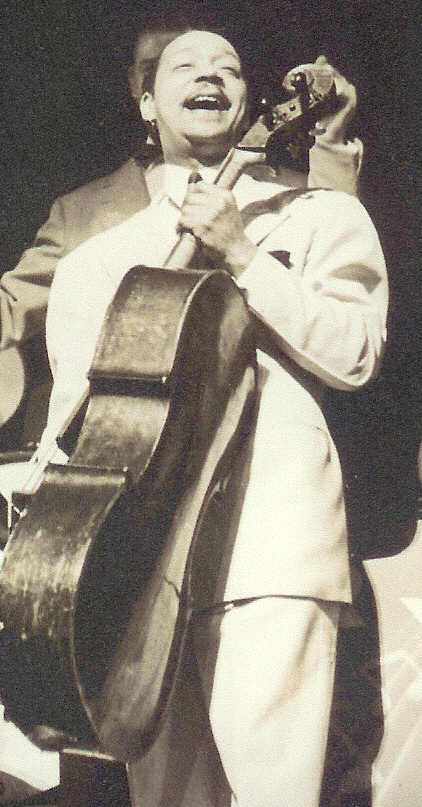(Born 17Feb/02, Chicago - died 18Oct/44, New York City)
THE MAN WHO HELD THE INK SPOTS TOGETHER
|
Before the Ink Spots: Information on Hoppy's early years is almost non-existent. Rather
than singing or playing the bass, he started his stage career as a dancer
and his nickname probably derived from his dancing style. Hoppy became one of the Four Riff
Brothers when that group was formed about December of 1932 and remained
a member until the group ended in September of 1933. Hoppy danced, sang
and played bass as a member of this group although the "bass"
was usually a guitar or cello strung as a bass since since it was easier
to do dance steps with a cello-sized instrument... |
Hoppy with his cello |
|
Hoppy Jones, the Talking Ink Spot: The Ink Spots were famous for two main reasons. One was Bill Kenny's sweet, high tenor ballads and the other was Hoppy's basso talking parts where he often talked to his "honey chile" in the middle of these ballads. The origin of this style is clouded. There are fabricated stories that exist to the effect that Hoppy forgot the words when he was recording the bridge on If I Didn't Care. According to Deek Watson's book [The Story of the "Ink Spots"] Deek had to whisper the words to Hoppy and this slowed Hoppy's delivery in a positive way. The truth seems to be that Hoppy's talking bridge evolved over time. Ink Spot's radio broadcasts from February and August of 1938 include songs with Hoppy doing a talking bridge that was identical to the style he used on If I Didn't Care. While other singers had talked on records and Hoppy had developed his talking style earlier, the release of If I Didn't Care made the Ink Spots ballad style, complete with the talking bridge, famous "on-the-spot." While subsequent bass singers (should they be called "talkers"?) of the Ink Spots have done the talking bridge, many, including Bill Kenny, have suggested that Hoppy's style was unique. Hoppy gradually stopped playing the bass/cello in the early 1940s. In his chapter on 1942, Marv Goldberg states that he didn't play at all by this time. Various sources suggest that Hoppy, as senior member of the group, was the glue that helped to keep the Ink Spots together until just before the time of his death. As time passed the difficulties between Bill Kenny and Deek Watson increased and sometimes resulted in physical fighting that even erupted onstage. While it is unlikely that Bill Kenny would have let Deek rejoin the group after he left in September of 1944, Deek would certainly have had a better chance of returning if Hoppy had still been there. Hoppy became ill in Chicago in late July of 1944 and Deek had to perform the talking parts until his return sometime in August. After his return, there were three recording sessions and a fairly heavy appearance schedule right up to the time he collapsed onstage at the Zanzibar in New York City on Oct 18th. He died later at home. |
|
Revised 28Feb/06
